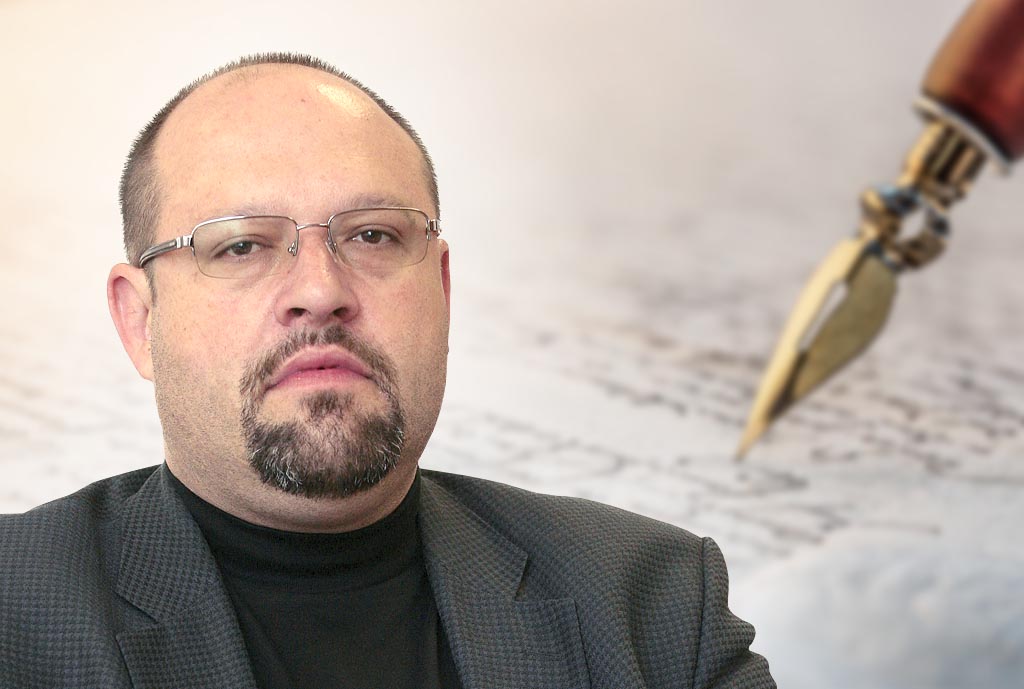By: Dr Matevž Tomšič
Do you still remember the bizarre episode that recently took place in the lobby of Radiotelevision Slovenia, when two uniformed police officers were looking for journalist and editor Jože Možina? To this day, we have not learned what the “law enforcement officers” wanted from him. Was it just an informational conversation or something more serious? Was the sought-after person a witness or perhaps a suspect? The police did not provide any explanations to the public. They certainly should have, as it is by no means usual for the police to look for journalists, especially not at their workplaces. Instead, the Ljubljana Police Department absurdly and evasively stated that Možina, by publicly revealing the matter, had exerted “pressure” on them. Who is the repressive authority here and who is the ordinary citizen (even one who is not in favour with the current authorities)? Public speech is the only means available to the latter to safeguard their freedom and integrity.
Clearly, there was no justified reason for the police visit mentioned (if there were, the procedure would have continued). Therefore, this act cannot be understood in any other way than as political pressure. And not even on Jože Možina, as he is accustomed to threats and attacks. It is a message to all those in this institution of whom there “are… less”, meaning those who are not aligned with the new, government-friendly leadership, to either comply or have their lives significantly embittered.
The goal of the ruling authorities and their enforcers is clear: to establish complete uniformity in journalistic reporting. Every session of the RTVS Council demonstrates how false the explanations of the ruling authorities were, claiming that with the new law, they wanted to “depoliticise” public television. Quietly, we can say that this politicised, one-sided, and extremist management body has never been seen in the history of public broadcasting, not just in Slovenia, but anywhere else. Its operation resembles the Central Committee of the North Korean Communist Party. In comparison, the Yugoslav State Security Service in the 1980s was practically a model of plurality. Decisions are usually made without a single dissenting vote. There is practically no discussion or exchange of opinions. The body that should represent the diversity of societal interests is, in fact, the purest exponent of the ruling politics, particularly that of the far-left party Levica. Its main (if not the only) concern is to hunt down “disturbing” elements and establish ideological and political purity.
As expected, the purges did not stop with changes in leadership. Although the mandates of the editors should not have ended, they decided to remove them through intense pressure. Jadranka Rebernik, the responsible editor of the information programme of TV Slovenia, resigned (before the RTV inquisition would have removed her based on imaginary accusations). The replacement of unwanted staff began immediately. Dear readers, when you hold a copy of Demokracija with this column in your hands, certain editors, journalists, and presenters will have already been removed, certain shows cancelled, or significantly altered.
It seems that we are heading for a purge unlike anything the public broadcaster has experienced since communist times. It is utterly perverse that those who are carrying it out now accused the previous leadership of political pressure and interference. However, all that was done back then was the engagement of a handful of new journalists and editors, some new shows, and the inclusion of an occasional external commentator. But even that was too much for the guardians of ideological orthodoxy. Now, a clique of radical leftist activists who are convinced that the media, which is compulsorily funded by all citizens with an electrical connection, simply belongs to them, has taken over an institution that should, by its mission, be pluralistic. The existence of such a media outlet, which is a tool for spreading a particular political-ideological agenda, is by no means in the public interest.
